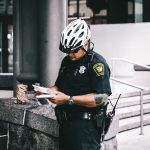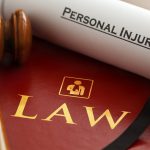Auto accidents can happen to anyone at anytime. You can protect your legal rights by doing the right thing after an accident occurs. This page summarizes some of the steps you should take if you are involved in an accident. The pamphlet also contains an Accident Information Form that you can keep in your car to record information if you are involved in an accident. Consult me right away if you are involved in an accident that involves personal injuries or serious property damage.
If your car is involved in an accident and you don’t stop, you may be subject to criminal prosecution. Leave your car as close as possible to the place of impact without obstructing traffic. After stopping, remain at the scene of the accident to aid the injured, protect the scene, report to the police and gather information.
If someone is injured, give first aid if you are qualified and call for an ambulance. Remember to note the location of the accident before you call for an ambulance. Tell the ambulance dispatcher the name and number of the street as well as the direction in which the cars were traveling at the time of the accident.
Protect the scene of the accident to avoid additional collisions. Do not allow your car to obstruct the road if it can be moved. Warn approaching cars by raising the hood of your car and using you car’s hazard warning lights. In addition, for nighttime accidents, place flares or reflectors on the road.
Call the police, particularly if someone has been injured. A police report of the accident will help your insurance claim and any liability claims. Ask the officer how to get a copy of the accident report and note the officer’s name and badge number. If you receive a traffic ticket, it does not mean you are guilty of a traffic offense or that you are responsible for the accident. Be aware that you may hurt your claim for damages from the other driver if you plead guilty. Consult your lawyer and insurance agent before pleading guilty to any traffic offense.
Exchange information with the driver of the other car. You should get the following information.
- Other drivers – name, address, phone number, driver’s license number, name of insurance company and policy number.
- Passengers – name, address, and phone number.
- Witnesses – name, address, and phone number.
- Owner (If not the driver) – name, address, phone number, insurance company and policy number.
Make notes about the time of day, weather conditions, road conditions, street lights, and length of skid marks. Also make a diagram of the accident noting the location of the vehicles, cross walks, stop signs and traffic. If you hit a parked car and can’t find the owner, leave a note with your name, address, and a summary of the accident.
When you exchange information with the other driver and give facts to the police, DO NOT admit responsibility for the accident. Things that you say can be used against you if there is litigation. You may think that you were responsible for the accident and later learn that the other driver caused it or that the other driver was equally at fault.
Before you allow a tow truck driver to pick up your car, be sure to ask the driver how much it will cost and tell the driver where to take your car. Get the name, address and telephone number of the driver and the towing company.
Ask the responding police officer when his/her accident report will be completed. Also make sure you ask her/her how you can get a copy of it. Get it as soon as you can so you can review it for errors or discrepancies!
Both you and your passengers should consider seeing a doctor after an accident. The doctor may recognize injuries, sometimes serious, that are not apparent to you. The charges for a doctor visit and medical should be covered by your car insurance. Don’t settle claims from the accident until your doctor has advised you about the extent of your injuries.
Call your insurance agent as soon as possible after an accident. Your insurance company may have grounds to deny coverage if you fail to give prompt notice of the accident. Follow up the phone call with a written notice and save a copy for your files. The written notice should contain information about the date, time and place of the accident, with names and addresses of the other drivers, injured persons, passengers, and witnesses. If you were at fault, your liability insurance should pay for any injuries or property damages. If the other driver is at fault but does not have insurance, your insurance may pay for damages to your car (collision coverage), your medical expenses (medical payment coverage) and even for your pain and suffering (if you have uninsured motorist coverage).
New Jersey is a “No-Fault” insurance state. That means your own car insurance company will pay for your own medical bills! Most New Jersey car insurance policies have coverage of $250,000.00 to cover your medical bills. However, check your policy to see how much “No-Fault” medical coverage you have.
NOTE: Most often your health insurance will pay for medical bills that are in excess of your policy limits.
If you’ve been involved in an accident, or if you’ve received a traffic ticket, call me as soon as possible. We can talk about your rights and responsibilities. The sooner you call me the better since witnesses (including you) may forget the details of the accident.
Most importantly, I can counsel you on how to answer to questions from insurance adjusters.







